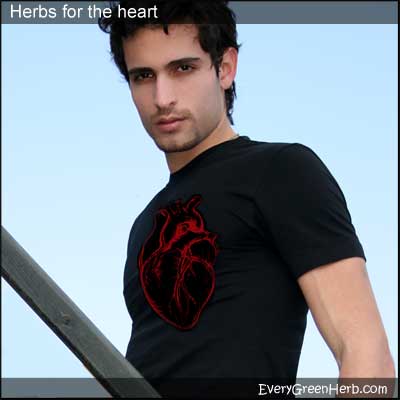Heart and high blood pressure herbs

Heart problems and high blood pressure are sometimes caused by poor eating habits, lack of exercise, and stress. Smoking tobacco, excess weight, and other destructive lifestyle choices affect the heart in negative ways.
Often heart disease can be reversed if lifestyle and diet are changed for the better.
Medicinal herbs can protect the heart and keep it healthy.
Herbs can help open blood vessels, regulate blood pressure, tone the heart, get the blood flowing, and purify the whole blood system.
When the heart skips a beat we know it. When it starts pounding, we know that, too.
High blood pressure is different. Since there are often no symptoms, high blood pressure is sometimes called the silent disease.
Herbs and natural remedies for a healthy heart are the same ones that help keep the blood pressure under control. Keep reading to find out more.

Try garlic, onion, and cayenne
Many herbs are good for the heart and circulation. Garlic, onion, cayenne, ginger, and bilberry are the most well known and the most effective.
Tony and I use a lot of these ingredients when cooking. We eat garlic and onion at least once a day in everything from sandwiches to stews. We also eat a lot of hot pepper and ginger when craving something spicy, at least three times a week.
Herbal teas and tonics can strengthen, repair, and tone blood vessels. Take one or two of the following every day in tea or tincture form.
- Garlic, onion, ginger, and cayenne
- Hawthorn berries
- Heartsease
- Astragalus
- Yarrow
- Echinacea
- Prickly ash
- Ginkgo biloba
- Barley or wheatgrass and green drinks
- Ginseng
- Wild cherry bark
- Peppermint and other mints
- Sage
- Hops
Switch around and see what you like. Adding herbs to your diet and daily routine is good for your heart, and your whole body.
The heart, massage, and aromatherapy
Poor circulation indicates a heart problem. Improve blood flow to and from the heart with herbal massage and aromatherapy.
Massage and aromatherapy with diluted black pepper essential oil can help improve blood flow and get the circulation going. Also try a blend of lavender, marjoram, and ylang-ylang essential oils during massage.
Aromatherapy and essential oils can also help lower blood pressure and bring about relaxation.
Reduce stress to lower blood pressure.
Aromatherapy can reduce stress which helps lower blood pressure. Essential oils like lavender can help the body and mind to relax, which is good for the heart.
Avoid rosemary essential oil because it can raise blood pressure.
If you have never used essential oils, you might want to give them a try. May favorite and one I find the most useful is lavender. I try to always keep it on hand.
Call an ambulance if you suspect a heart attack.
Shortness of breath, uncomfortable racing of the heart, dizziness, fainting, nausea, unexplained pain in the upper torso, or a vise-like pressure across the chest area can be signs of heart attack.
If you think you are having a heart attack, seek immediate emergency help.
Heart problems come in many forms with varying symptoms. Arrhythmias are electrical disruptions. Palpitations occur when the heart is beating out of sequence.
Abnormal fatigue, swollen ankles, and excess fluid or mucus in the lungs are signs of congestive heart failure. If you experience these type symptoms, see your healthcare professional.
More herbs for the heart
Chamomile or lemon balm tea at bedtime can protect the heart, lower blood pressure, and give restful sleep. Other herbs for the heart include dandelion, linden, and guelder rose.
Hawthorn, yarrow. and linden are considered heart tonics because they relax the blood vessels and improve blood flow. Hawthorn also strengthens the heart muscle . Linden relaxes and heals blood vessels especially when combined with hawthorn or ginkgo biloba. Guelder rose can be combined with hawthorn and valerian to relax the whole vascular system.
For best results, work on reducing stress in your life. Also, eat right and get plenty of sleep. To keep the circulatory system working at peak performance, exercise every day. Lifestyle is important when it comes to the heart!

Hawthorn for the heart
Do you have a hawthorn shrub or know where one is located? In this video, Yarrow Willard shows us how to pick hawthorn berries for use in natural heart remedies.
Eat right for heart health.
Many foods are considered good for the heart. Fish, fresh greens, sunflower seeds, oat bran, oatmeal, green drinks, fresh pineapple, bananas, cantaloupe, apricots, papayas, mushrooms, tomatoes, yams, sweet potatoes, tofu, oysters, clams, and whole grains supply the heart with plenty of necessary vitamins, minerals, and antioxidants.
Small amounts of wine also provide benefits.
Avoid salty foods, fatty foods, fast foods, and foods high in calories. Reduce intake of sugar, caffeine, fluoridated water, chlorinated water, and alcohol.
Women need balancing herbs.
Heart disease in women is sometimes hormone related. Post menopausal women should consider taking hormone balancing herbs like licorice, chasteberry, dandelion, ginseng, or evening primrose.
High levels of iron (iron overload) after menopause may put women at increased risk of heart disease. Get lots of exercise which helps rid the body of excess iron.
Old time heart remedies
An old remedy for stopping heart palpitations was to plunge the face into cold water. Cold water was also used to stop panic attacks.
In emergency cases of suspected heart attack, a teaspoon of cayenne powder was given by mouth to help the person survive.
Ginger was used on a daily basis to protect the heart. It works a lot like aspirin.
Modern day studies have shown that these old remedies can help bring a victim out of an attack.
Read more about using herbs to treat panic attacks and anxiety.
Since grief and loneliness are bad for the heart, also see herbs for treating stressful situations.
*Note - if you take small doses of aspirin on a daily basis for your heart, ask your doctor before consuming any herb in therapeutic amounts.

Treating high blood pressure
High blood pressure may be caused by stress, smoking, clogged arteries, calcium deficiency, fiber deficiency, a high fat diet, insulin resistance, poor sugar metabolism, thyroid imbalance, obesity, lack of exercise, too much salt and red meat in the diet (causing raised copper levels), excess alcohol consumption, kidney malfunction, and constipation.
If you suspect that your blood pressure is high, seek medical attention.
Most drug stores offer free blood pressure checks. A blood pressure reading of 110/74 is normal for a thirty-five year old man.
Get your blood pressure checked regularly.
At first, a person with high blood pressure will not experience any noticeable symptoms. Symptoms appear later and can include headaches, eye problems, dizziness, fainting spells, nosebleeds, irritability, ringing in the ears, flushed complexion, red streaks in the eyes, fatigue, depression, and chronic respiratory problems.
Blood pressure tests are quick and painless. Visit the Mayo Clinic website to see a chart with normal ranges of blood pressure. If you are diagnosed with high blood pressure, follow your doctor's instructions so that your heart stays healthy.
Diet can help.
Eat oatmeal, flax seed, and wheat germ to lower blood pressure naturally.
High blood pressure can be lowered with good diet and exercise. Add lots of fiber to the diet and reduce fat intake.
Avoid artificial sweeteners and antihistamines.
Lots of citrus and other fruits are a must. Wheat germ, oatmeal, flax seed oil, buckwheat, blackberries, strawberries, and green drinks should be consumed regularly. Eat smaller meals and reduce calories for best results.
Rid the body of excess fluid with uva ursi, corn silk, and dandelion.
Diuretic herbs are sometimes used in the treatment of high blood pressure. Uva Ursi, corn silks, and dandelion are will known for helping rid the system of excess fluid.
When taking any diuretic, extra vitamin C should be added to the diet. Potassium and mineral supplements may also be needed to maintain proper balance.
Diuretics also call for drinking more water to avoid dehydration. It is never good for your body to become dehydrated!

Lower blood pressure with deep breathing exercises.
Exercise, deep breathing, prayer, and meditation are key factors in reducing high blood pressure, especially when it is due to stress. When practicing deep breathing, combine with aromatherapy for best results.
Other remedies for high blood pressure
Niacin supplements can help lower blood pressure by increasing size of blood capillaries. Sometimes this causes flushing or hot flashes.
Using a dry skin brush can stimulate circulation and help lower blood pressure.
An old remedy for high blood pressure sounds silly but doesn't hurt to try. Just pull the middle fingers three times a day for 20 seconds each time.
Scientific studies on herbs and the heart
Studies show that herbs are effective when treating cardiovascular disease. Four plants show promise including ginseng, ginkgo biloba, reishi mushroom (Ganoderma lucidum), and jiaogulan (Gynostemma pentaphyllum).
These herbs have thousands of bioactive components that have therapeutic applications when treating heart disease, plus they contain high levels of flavonoids, terpenoids, saponins, and polysaccharides.
Ginseng is especially potent. It lowers blood cholesterol levels and reduces the formation of atherosclerotic lesions induced by a high cholesterol diet.
Ginkgo biloba is also a powerful herb that fights heart disease. Containing high levels of flavonoids and terpenoids, ginkgo biloba reduces free radical generation and protects nerves against neuro-inflammation.
Astragalus is also shown to help treat heart disease by improving cardiac function and improving energy metabolism. It also has strong antioxidants that fight free radicals.
Garlic has also been studied in relation to heart disease. It is an excellent choice when treating hypertension, oxidative stress, inflammation, and hyperlipidemia.
Hawthorn, saffron, hibiscus, yellowroot, viola, lemon balm, motherwort, barberry, aloe vera, cinnamon, bergamot, licorice, and green tea can also help fight heart disease.
Other heart problems
Smokers, people with heart disease, and people that suffer from poor circulation can develop a condition known as chilblains when exposed to cold and damp weather. Painful, itchy areas are caused by an abnormal reactions in the blood vessels. Usually they can be relieved with calendula ointment.
*Garlic may interact with prescription blood thinner medications such as warfarin. Hawthorn can increase the effects of many prescription heart medications.
Always consult with a healthcare professional before adding any mineral supplement to the diet. An imbalance in minerals can cause heart problems to get worse. Severe imbalances can be fatal.
Strokes sometimes occur with heart disease. Sudden weakness, numbness, trouble talking or understanding speech, light-headedness and feelings of tingling sensations, dimness or loss of vision (perhaps in just one eye), severe headaches with unsteadiness, or a sudden fall can be symptoms of a stroke. As in cases of heart attack, treat suspected strokes as an emergency and call for an ambulance.
Always consult with a healthcare professional before taking any herbal remedy especially if taking prescription medications, if you are pregnant, or nursing.
Sources:
https://www.ncbi.nlm.nih.gov/pmc/articles/PMC7155419/
https://www.ncbi.nlm.nih.gov/pmc/articles/PMC7340875/
Blessings to you and yours!
Thanks so much for reading my blog. Jan.

*Note - the information on this website has not been evaluated by the Food and Drug Administration.
© 2005-2024 website design and content by Janice Boling